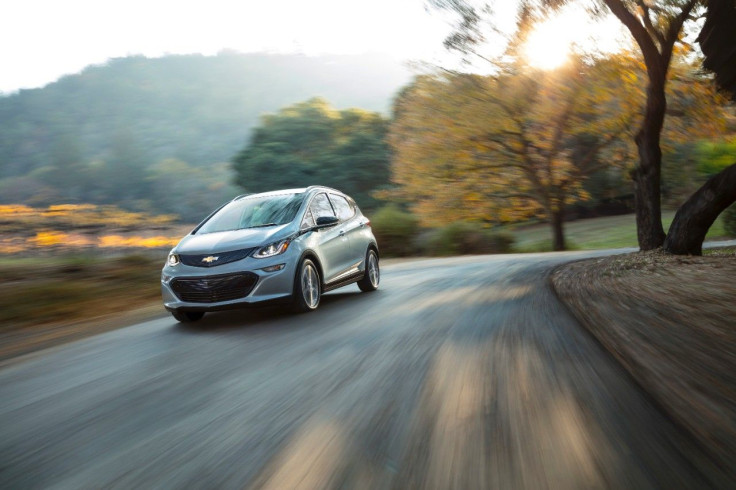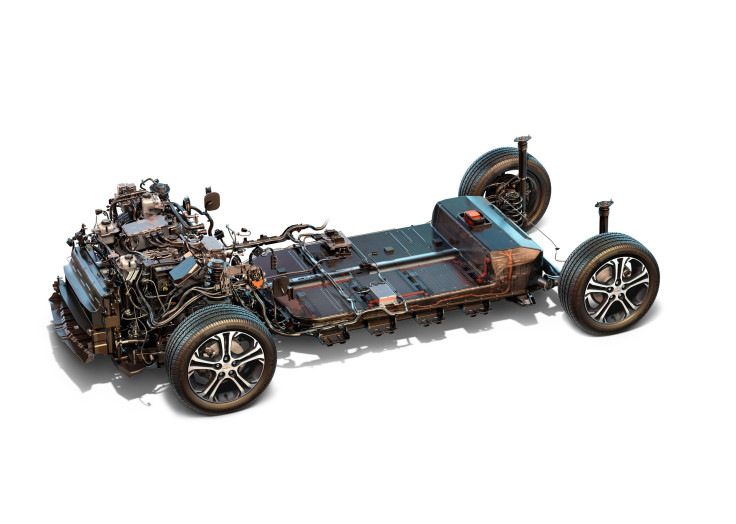Detroit Auto Show 2016: Chevrolet Bolt Specs Reveal Battery Size, Top Speed, Charging Time [VIDEO]

After the next sub-$40,000 all-electric car made its debut at CES in Las Vegas last week, more details about it emerged Monday. The 2017 Chevrolet Bolt, planned to go on sale nationwide after production begins this fall, will have a top speed of 91 mph and accelerate from zero to 60 in under seven seconds.
General Motors Co. revealed these and other facts about Chevrolet’s answer to the BMW i3, the Nissan Leaf and possibly the forthcoming Tesla Model 3 during a press event at the 2016 Detroit Auto Show.
Fully electric vehicles constitute a sliver of the overall car market, and many of them are sold at losses as so-called compliance vehicles, meaning they are produced to meet gradually stricter emissions standards in many developed markets. Fuel-economy standards are based on an average of all vehicles made by a given manufacturer, so the lower emissions of electric, hybrid electric and small-engine cars in a regulatory sense subsidize the production of higher-emission SUVs and trucks.
However, GM clearly wants the Bolt to be more than just a compliance vehicle. When it goes on sale this year, the Bolt is expected to have the longest range per charge of any electric car besides the six-figure luxury Tesla Model S sedan and Model X utility vehicle. The price tag: $30,000 after a $7,500 tax rebate by the federal government. Depending on where a buyer lives, U.S. state incentives could bring the price down even more.
“Being the leader in range and affordability means nothing if the car isn’t going to excite you each time you get behind the wheel,” Josh Tavel, the chief engineer of the Chevrolet Bolt, said in a statement. “That’s why the team was tasked with delivering a propulsion system that would also make the Bolt EV an electric vehicle that owners would love to drive.”
Don't order your @chevrolet Bolt with a head cold, or else you'll end up with a Volt. #NAIAS #NAIAS2016 pic.twitter.com/zQhdnDecOb
— Roadshow (@roadshow) January 11, 2016The Bolt will have the advantage of electric torque, and GM expects the production version to push out 200 horsepower. Electric motors produce instant full torque, while gasoline engines have to rev up to speed, so the Bolt should outperform gas-powered econoboxes. And the top speed of 91 mph is likely to be more than adequate for electric-car drivers.
Something between a hatchback and a small SUV, the Bolt will haul a 960-pound 60-kilowatt lithium-ion battery pack manufactured by the South Korea-based LG Corp. The electronics giant will also produce the drive unit and motor and at its facility in Incheon, GM said.

The Bolt, expected to have a range of 200 miles per charge, will take nine hours to fully power through a conventional home-based electric-car connection. The car can draw an 80 percent charge through a DC fast-charging system, such as the ones popping up along roadways and in parking lots across the country. This means owners should get about 160 miles per quick-charge hour, although mileage will vary depending on multiple factors, such as the use of air conditioners and heaters.
GM also said Monday the Bolt will have 360-degree camera vision, a new and more effective regenerative-braking system, and an on-board navigation system that will guide drivers to the nearest charging station.
© Copyright IBTimes 2024. All rights reserved.






















